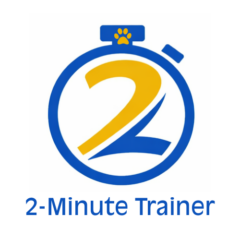You and your dog share a connection. Dogs are particularly sensitive to our emotions – they seem to just know when we’re sick, upset, angry, or happy.
Dogs are attuned to our emotions
They’re so attuned to us that our laughter makes them happy, too.

An unforeseen consequence can show up in training. It happened recently with Simon, Fran’s 1-year-old Boston Terrier. She was teaching him to “roll over” and, when he got it right, she would giggle. Every single time. Because it was adorable. And because he’d mastered it, both ways, in very little time.
In no time flat, it became Simon’s “go to” offered behavior. Whenever he didn’t “get” what Fran was asking, he would default to “roll over.” And she laughed – every single time.
Normally, it’s not a problem to have your dog do something cute whenever you look at him. Cute tricks are one of the great joys of dog training. It’s entertaining and enriching for everybody – human and dog.
But when it matters, we really want our dogs to listen to what we’re asking them to do. We do have “freestyle” sessions where they offer behaviors, come up with new things, try anything they like, and it’s all rewarded. But when we’re working on a particular behavior or sequence, our dogs need to pay attention.
We know that Simon’s “roll over” was his way of letting us know that he was unsure. He didn’t know what Fran wanted, so he did something that always seems to make her happy. He was letting us know that he didn’t “get it.”
Past rewards = current behavior
When your dog seems to offer random behaviors rather than “paying attention” and “doing what you want,” he’s letting you know he’s unsure. And he wants you to be happy, both with what he’s doing and with him. So he’s doing something that’s gotten him rewarded in the past.
We found that we were going a bit too fast for Simon with a behavior that has lots of steps. Every dog has his own learning pace, and we need to recognize where our dogs are in each step. And just because a dog takes a while to learn one particular piece doesn’t mean he’s slow. Another part could be “no problem, I got this!”
Every dog has his own learning timetable
Just like people, dogs are individuals who learn differently. Hope is a terrific baker, but a so/so cook. It’s not that she’s terrible at it, just not particularly talented. She does fine with a recipe, followed step by step, but has a more difficult time improvising a good savory dish. Her brain just doesn’t work that way. Fortunately, there are lots of recipes available.
Just like the recipe for dog training success. If your dog is having a more difficult time with a particular behavior or piece of it, take a step back, reinforce what he does know, break down the next step even further. And move at your own team’s pace. There isn’t any timetable – there’s a lifetime of fun to enjoy together.
Video of Simon’s “Roll-over”
Watch quick or you’ll miss it!
